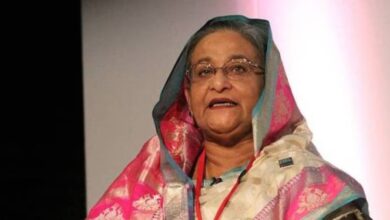Pak PM Imran seeks legal opinion on no-confidence motion

Pakistan Prime Minister Imran Khan has met the Attorney General and sought legal opinion on the no-confidence motion submitted by the Opposition parties which have held his government responsible for the uncontrolled inflation.
According to the Dawn newspaper, the government is anxious and making all attempts to foil the Opposition’s move to oust the Pakistan Tehreek-i-Insaf (PTI) regime led by Khan, who has already claimed that the powerful Pakistan Army is backing him.
The no-confidence motion, signed by about 100 lawmakers from the Pakistan Muslim League-Nawaz (PML-N) and Pakistan Peoples Party (PPP), was submitted with the National Assembly Secretariat on Tuesday.
Khan, 69, is heading a coalition government and he can be removed if some of the partners decide to switch sides, which is not unusual in parliamentary democracies.
The report said that besides meeting Punjab Chief Minister Usman Buzdar, whose removal has been sought by the Prime Minister’s (former) closest confidants in the party, Prime Minister Khan also met Attorney General for Pakistan (AGP) Khalid Javed Khan and sought his legal opinion on the no-confidence motion.
The prime minister is scheduled to meet leaders of the PTI’s allies, including the Muttahida Qaumi Movement, Grand Demo¬cratic Alliance and party leaders in Sindh, it said.
Opposition parties blame Khan’s government for uncontrolled inflation that has broken the back of poor people of the country, while Khan accuses them of trying to remove as he was not willing to condone the alleged corruption by the leading Opposition leaders.
Soon after the Opposition submitted its no-confidence motion in the National Assembly (NA) Secretariat, Khan said that he was going nowhere and that he did not fear the Opposition’s move.
“The government will not be ousted, and will emerge stronger,” Khan was quoted as saying.
Information Minister Fawad Chaudhry said that the prime minister was quite confident that the Opposition would face disappointment and the government would become stronger after he regained confidence in the NA.
Khan also said that he was happy this would be the Opposition’s ‘last attempt’ to oust him.
“We will defeat them in such a way that they will not be able to recover from it until 2028,” he said, indicating that he would be reelected in 2023 for another 5-year term.
Khan, a former cricketer, came to power in 2018 and elections are to be held in 2023 if he succeeded to ward off the challenge of no-trust move.
The prime minister also said that there were “multiple foreign hands” backing the Opposition, adding he was completely prepared to handle the political situation.
“A Captain doesn’t reveal his strategy all at once,” he said.
He also alleged that lawmakers were offered bribes of Rs 180 million (USD 1 million).
He reiterated that the Pakistan Army would never support “these thieves” (Opposition leaders).
“The Opposition does not have the support of the people so they say the establishment is with us.
“What will happen if the no-trust move does not succeed? A mind game is being played, and I am the master of mind games,” Khan added.
On Tuesday, PML-N president and Leader of the Opposition Shehbaz Sharif, who was flanked by former president and PPP co-chairman Asif Ali Zardari and Jamiat Ulema-e-Islam Fazl (JUI-F) chief Maulana Fazlur Rehman, told a press conference that “We have taken this decision for the people of Pakistan and not for ourselves”.
As per rules, signatures of at least 68 Members of Parliament were required to force the Speaker to summon a session, which should be convened between three to seven days to conduct a vote on a no-confidence motion.
In the house of 342, the Opposition needed the support of 172 members to remove the Prime Minister and his Cabinet.
The Speaker of the National Assembly is expected to call the lower house in session by March 22, while voting on the no-confidence motion must take place between March 26 and March 30, the Dawn report said.
Reacting to the Opposition move, Prime Minister Khan said that the country’s powerful Army was with him and he was confident that the government was not going anywhere.
The powerful Army, which has ruled Pakistan for more than half of its 73 plus years of existence, has hitherto wielded considerable power in the matters of security and foreign policy.
Last year, Khan received 178 votes when he had decided to seek a vote of confidence after a candidate supported by his party lost the Senate election.
On paper, Khan still enjoys that support, comprising 155 members of his PTI and 23 from coalition partners, including seven from Mutahida Qaumi Movement (MQM), five each from Pakistan Muslim League (PML) and Balochistan Awami Party (BAP), three from Grand Democratic Alliance (GDA), one each from Awami Muslim League (AML) and Jamhoori Watan Party (JWP) and one independent member.
The total Opposition number is 163, including 84 from PML-N, 56 PPP, 15 Muttahida Majlis-e-Amal Pakistan, four Balochistan National Party (BNP), one Awami National Party (ANP) and three independent lawmakers.
The Opposition has claimed that they have the backing of 28 lawmakers of the ruling party and others from an ally of the government.
In 2018, Khan had promised to rid the country of corruption and create a new Pakistan.







